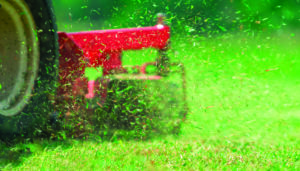
After mowing, grass clippings and plants that are already spent for the season provide a great source of high-nitrogen, green materials for a compost pile.
This month is peak harvesting season for summer crops. Harvesting fruits, veggies, and herbs is important for your plant to understand it needs to keep producing.
What happens when you leave fruits and vegetables on the vine or plant? We’ll find out.
You might also be experiencing issues with your houseplants right about now, so we’ll talk about what signs to look for.
And we can’t forget those extra few steps to make sure you’re taking care of yourself while you’re taking care of the garden.
In the Garden
In last month’s issue, we discussed dealing with powdery mildew, but let’s talk about preventing it.
High heat and humidity create the perfect environment for powdery mildew to thrive in, so the best way to combat this is by watering a little more strategically, so as to not get the foliage wet.
Rain is inevitable, but the more you can prevent water from sitting on the foliage in the heat, the better.
So if you can, try to direct water into the soil. Tomatoes, lettuce, and zucchini are just a few of the plants that are known to be susceptible. If you’re still having this issue, come talk to us at Robin’s Nest, and we’ll get you sorted out with fungicide.
Now is a great time to pick and dry any herbs that you planted, too.
They can be hung to dry in a dry, semi-shaded room. After dried, they can be stored in airtight containers.
To achieve the most prominent taste, try to harvest the herb leaves right before the plant blooms.
Make sure to continue harvesting veggies and herbs.
Being too late to harvest could cause plants to terminate, or stop producing as they complete their reproduction process.
Additionally, not harvesting can lead to your fruit or vegetables to rot, which will then attract bugs, fungus, and bacteria that break down organic waste.
Although this sounds like it should be fine, welcoming these types of bugs and bacterias into your home is not a good idea at all.
Not only could this jeopardize the health of your garden, but it could affect your neighbors as well.
Remove and dispose of all rotting or dropped fruit.
Aside from the preventative measures that this takes against animals, bugs, fungus, and bacteria, this also helps to reduce overwintering of any pests or diseases that would otherwise wait around until the next season to attack your fruit plants.
Additionally, if fruit or veggies are left on the plant or ground, there’s a chance it could go to seed, and next year you’ll have a lot more plants where you didn’t want them.
However, again, the negative effects it could have on you and your neighbors gardens are just not worth it.
Around this time of the year, some annuals and perennials are done blooming.
Similar to fruit, you don’t want your annual flowers to go to seed — unless you’re not worried about them blooming again, and would prefer to just wait until next year.
If you would like your annuals to go to seed, keep in mind that any hybrids will not produce offspring that are true to the parent plant.
If you want your annuals and perennials to re-bloom, take the time to deadhead them.
Other flowers such as zinnias and marigolds can also be deadheaded to encourage reblooms.
Any yellowing or browning shrub leaves on plants such as hostas leaves can also be removed.
In the House
If anything needs to be repotted, wait to do so until the evening.
Repotting during high temperatures and humidity in the middle of the day could cause serious stress damage to your plants.
If you have browning edges on any of your plants foliage, it’s likely due to humidity. However, if you live in town (as in Easton), it could be due to the fluoride in the water — which is known to burn the tips and edges of plants.
So, if you do live in town, I would strongly consider getting a filter for your tap, or buying and using distilled water for your plants.
If it’s humidity, a great way to naturally boost humidity is by grouping multiple plants together in an area.
If you’re already running a humidifier and know the issue isn’t fluoride, it’s likely a much more frustrating issue such as pests or a fungal disease.
This sure has been a summer for houseplant pests.
So, again, if you notice a plant looking unhappy, but you know its not over-watered, under-watered, and receives the right light, you should check for common culprits (such as spidermites, aphids, mealybugs, fungus gnats, and whiteflies).
Tiny white spots all over a stem or at the base of a leaf are not normal.
Bring a sample to us, and we’ll help formulate a treatment plan for your pest and fungal issues.
In the Yard
I recommend really avoiding mowing your yard in extreme dryness or heat.
When you mow, it wounds grass blades and allows more surface area of moisture to escape. So, if you mow on a day that’s not so hot or dry, there will be less evaporation of water from the grass.
I highly recommend keeping your lawn at 3 to 4 inches for the best results.
The height of 3 to 4 inches is perfect to provide enough shade, it helps to prevent weeds from germinating and thriving, and it allows the lawn to hold more moisture than it normally would if it was cut as short as possible — which keeps the grass hydrated and healthy.
Remember, the shorter you mow, the more stress your lawn will be under.
After mowing, grass clippings and plants that are already spent for the season will provide a great source of high nitrogen green materials for your compost pile.
Be sure to keep sticks, roots, and any other large branches out of the pile since they take way too long to break down.
Last month we talked about mosquito dunks, but let’s talk about where mosquito breeding sites can be hiding on your property.
Mosquitoes lay their eggs in water, so any container that collects even a small amount of water is at risk of becoming a home for these unwanted tenants.
Consider checking places such as clogged gutters or bird baths.
Make sure you refresh and replace bird bath water on a regular basis to prevent this.
To Close
Don’t forget when you’re working outside, make sure to hydrate and wear sunscreen.
Those may go without saying, but they’re very easy to forget when you’ve got a plan to work outside in the yard.
Gardening or mowing the lawn is not worth the risk of skin cancer or heat stroke, so take those preventative measures, and try to work outside in the early morning or later evenings.
This heat is no joke, so make sure you’re taking care of yourself and others. Stay safe and hydrated!
(Editor’s Note: Ken Morgan is the owner of Robin’s Nest Floral and Garden Center in Easton, Md.)



